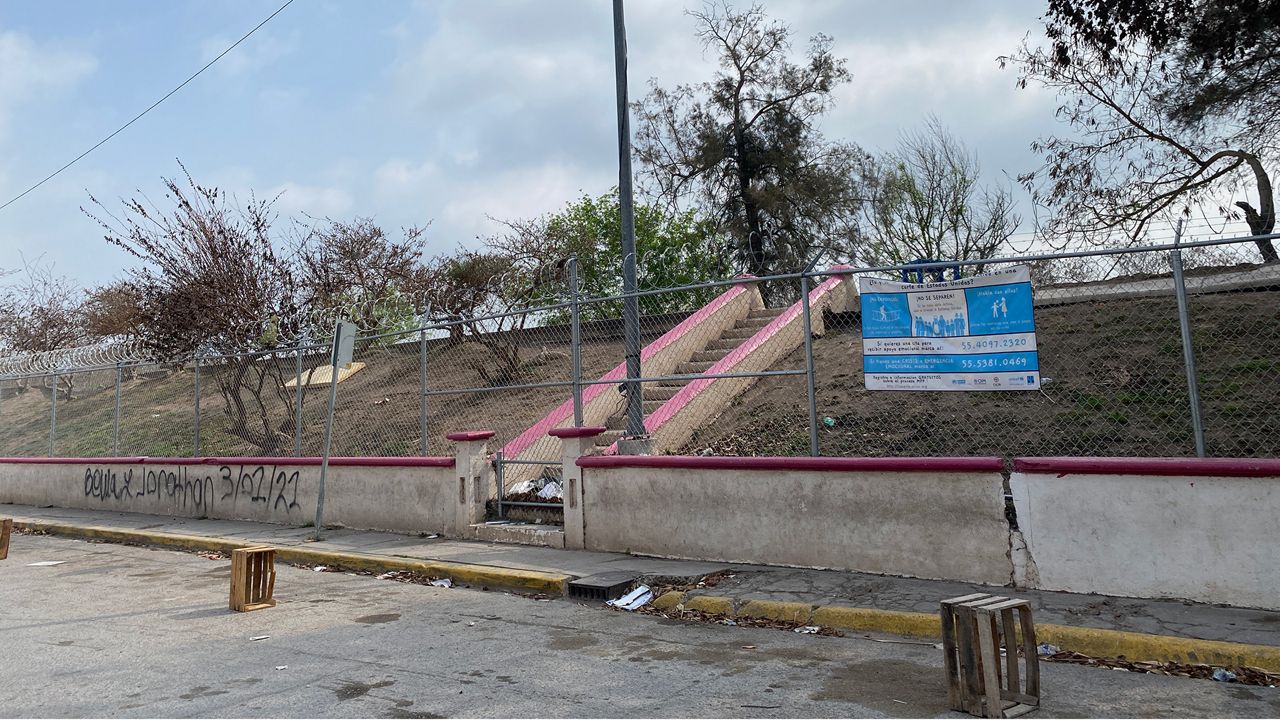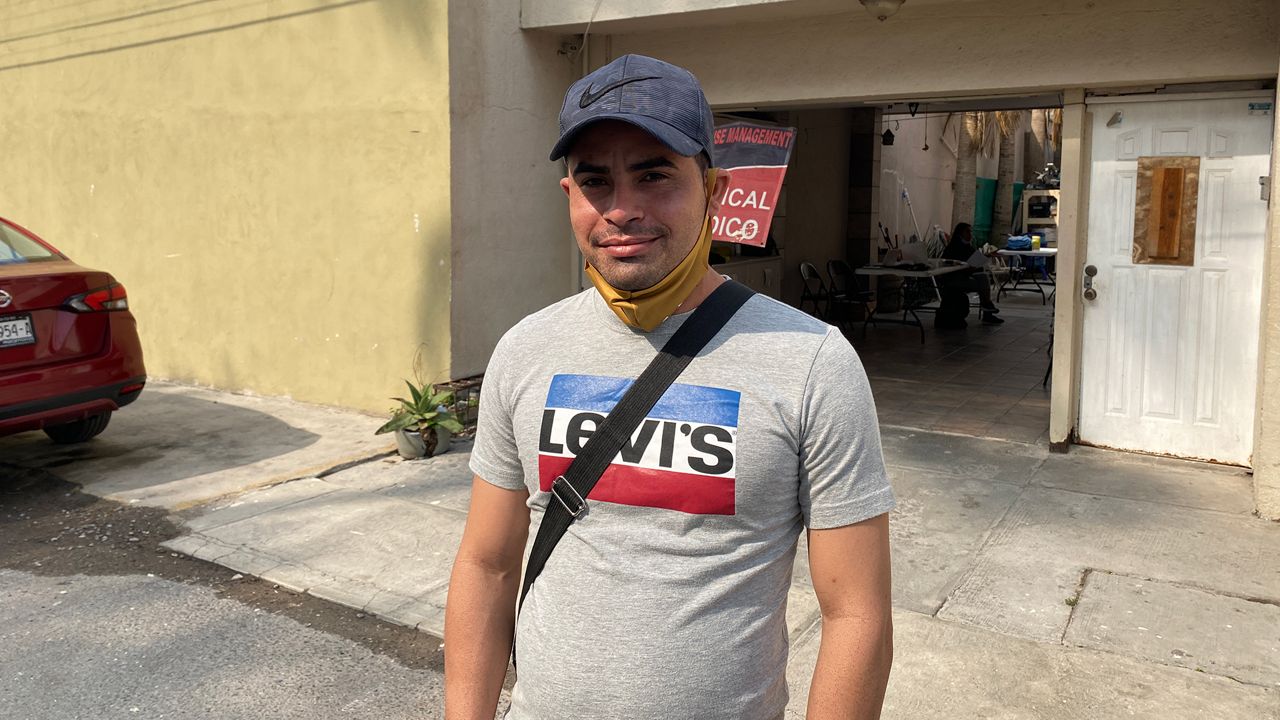This is the second in a series of Spectrum News reports from the U.S.-Mexican border. MATAMOROS, Mexico — It took two severe beatings from the Cuban police to set Humberto Fonseca’s escape plan in motion. The first beating came after had refused to take part in a political rally for the communist party. The second beating occurred when he refused to vote in a national election, and it came with a warning: We have ways of making you disappear. “I thought they were going to kill me,” he said. “I had no choice but to leave.” So, Fonseca said he fled Cuba in March 2019, leaving behind a daughter and wife. Traveling by bus, car, and on at least one occasion, horseback, he made his way to this Mexican border city on the banks of the Rio Grande River, where he planned to turn himself in to U.S. immigration officials and seek asylum. It’s now been two years, and Fonseca has been patiently waiting for his case number to come to allow him to cross into the United States. Fonseca is one of several thousand asylum seekers caught up in the Migration Protection Protocols, or MPP program. Also known as the “Remain in Mexico” program, the MPP was created during former President Donald Trump’s term and registered an estimated 70,000 people. Cases such as Fonseca's are back in focus as an increasing number of migrants have created both a political and immigration challenge for President Joe Biden. U.S. Customs and Border Protection reported more than 100,000 encounters along the southwest border in February alone, a 28% increase from the previous month. This week, Homeland Security Secretary Alejandro Mayorkas warned that U.S. border control could see more encounters along the southwestern border this year than at any time in the past 20 years. Under the MPP program, applicants for asylum who attempted to enter the U.S. via the southern border were registered with U.S officials, given an asylum case court date, and then returned to Mexico to await their court date. Opponents of the MPP program said forcing applicants to wait for their court date outside of the U.S. meant many would fail to get counsel for their asylum case as well as to find resources to stay in Mexico for extended periods of time. Many would instead give up or try and cross again illegally, they argued. The Trump administration, in March 2020, suspended the already slow processing of MPP case review because of the pandemic, creating what seemed like an endless pileup of cases. Biden restarted the program’s case review process on February 19, as part of his administration’s promise to take a more humane approach to immigration reform. But by then, only an estimated 42,000 cases had been processed during the two years. Tens of thousands of cases like Fonseca remain backlogged. Thousands of those who were turned back ended up in a tent camp here in Matamoros. The camp’s squalid conditions became a talking point for immigration rights advocates who assailed the Trump policy.  Once a place a desperation and despair, the Matamoros migrant temp camp has been cleared as thousands of migrants and refugees living there have been either processed through the U.S. or abandoned the camp for other options.
Still, thousands more took their chances and paid a smuggler to get them across the river to reenter the U.S. illegally and take their chances. An alarming number of unaccompanied children have crossed this year, creating a huge challenge for the border control, their first line of contact, and then the Dept. of Health and Human Services, which is charged with sheltering them next until they can be placed with vetted relatives or sponsor families. The border control has not confirmed, but it is estimated to have 4,000 unaccompanied minors in its facilities, while HHS has said 9,200 are in their custody. Biden has directed the Federal Emergency Management Agency (FEMA) to assist with transferring and finding other shelters for the minors and opened more shelter facilities in Texas and Arizona. With Republicans blaming Biden for the current migrant influx, the president, in an interview with ABC News on Tuesday, defended his administration’s approach and asked for patience as it worked to reform what it described as the country’s battered and dismantled immigration policies, inherited from the Trump White House. The White House said in February when it restarted the review of MPP program applicants that it was just “the first phase in the administration’s work to reopen access to an orderly asylum process.” But in the interview, Biden urged those thinking of trying to cross the border now to think twice. "I can say quite clearly: Don't come," Biden said. "We're in the process of getting set up, don't leave your town or city or community." Fonseca’s patience with his nearly two-year wait ebbs and flows, he said. The Mexican Red Cross told Spectrum News 1 that as many as 1,400 MPP cases had been processed and allowed to cross, leaving an estimated 2,000 more people still believed to be living in Matamoros. Fonseca has watched those who have been allowed to cross the border in the United States with both envy and a sense of hope. If they make it over legally, surely my turn must be around the corner, he said. He has refused offers to risk the crossing illegally. “Trust me, the thought crossed my mind,” he said. He’d overheard other migrants discuss the idea of swimming or rafting across the river but resisted the temptation. “I’m going to do this the right way.” Instead, he’s stuck to his plan, bid his time in Matamoros by picking up odd jobs doing manual labor and cleaning. When the Trump administration suspended the MPP program, he waited. He watched as the White House changed hands and hoped for the best, still sticking with his plan to get to Houston, where an aunt and uncle were waiting for him. When Biden announced that the MPP case reviews would restart in February, Fonseca monitored his account online every day, hoping for a status change. “If what Biden says is true, that he’s going to open up the asylum process to people again, then it will be good for everyone,” Fonseca said. “I do think people will listen to him and stay in their countries as long as they can if they know they can eventually try and come the legal way.” On Wednesday, Fonseca hung out around a volunteer-run migrant health clinic located across the street from the former tent camp. Other migrants with MPP cases compared notes on where their cases were in the process and shared news about others who had already made it across. Fonseca made a routine stop at an office of immigration legal aides and returned with good news. His case had cleared the verification process. He had a court date set for July. There was now just one step remaining: Permission to enter the U.S. |
A Trump-era Backlog of Asylum Cases Slowly Whittles Down Amid Migrant Surge
PUBLISHED 6:29 PM CDT Mar. 17, 2021



